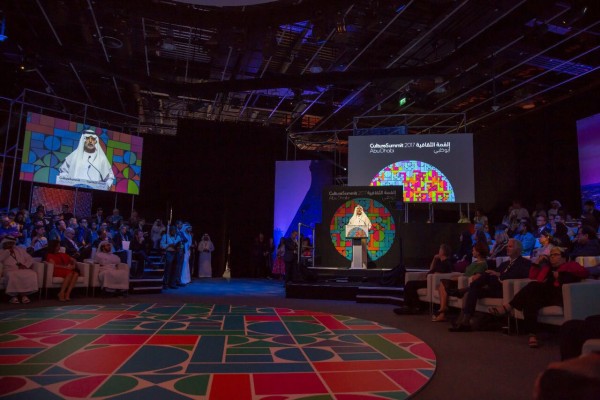UAE's transformation into a global cultural ecosystem did not happen overnight: Minister tells CultureSummit 2017
By egor Tuesday, 11 April 2017 10:01 AM

WAM -- The CultureSummit 2017, a gathering of delegations representing almost every country in the world, commenced on Sunday with a keynote address from Sheikh Nahyan bin Mubarak Al Nahyan, Minister of Culture and Knowledge Development, in which he highlighted that for the UAE, transformation into a global cultural ecosystem did not happen overnight.
"This city grandly illustrates your subject, the global cultural ecosystem. Abu Dhabi is the perfect site for CultureSummit 2017. The world has come to Abu Dhabi, and together our guests and we, UAE citizens, have created a global cultural ecosystem," Sheikh Nahyan told the participants who came to the summit to discuss common interests, create new collaborations and address in concrete ways challenges ranging from the preservation of cultural heritage to understanding the disruptions likely to be associated with emerging technologies.
Curated under the theme, "Culture as a Change Agent in the Digital Age," CultureSummit convened with over 300 high-level participants in government, arts, philanthropy, heritage preservation, education, media, science and technology from every region of the world to discuss culture and common interests, create new collaborations, and address concrete ways in which they can address today’s societal and political challenges.
For the UAE the transformation into a global cultural ecosystem did not happen overnight, Sheikh Nahyan noted. "When our nation’s founder, the late Sheikh Zayed bin Sultan Al Nahyan, united the Emirates and established our nation in 1971, most of us knew relatively little about the world beyond our desert and our coastline. Strangers traveled the trade routes, but few foreigners actually lived and worked in our land. We had no national education system. We simply lived among ourselves."
The UAE did have, however, a courageous and enlightened leader "who knew that we must establish strong connections to the rest of the world if we were to build the country that he envisioned."
The late Sheikh Zayed knew that "the first priority of the newly formed UAE must be good education."
"With his wife and Mother of the Nation Sheikha Fatima bint Mubarak, he knew that women must play a role equal to men if we were to develop fully and fairly. He knew that our linguistic skills must extend beyond our beloved Arabic language and embrace the universal power of other languages," Sheikh Nahyan added.
Sheikh Zayed also knew that "we had to immerse ourselves in the wonders of science and technology and capitalise on the latest advances, that we must see and hear and engage people who are not part of our own culture, and that we must come to understand and respect the scores of different cultures, nationalities, ethnicities, religions, and beliefs represented in our country."
Sheikh Nahyan noted that the late Sheikh Zayed Sheikh Zayed wanted our country to become a sound force in the global economy. The founder of the UAE once said, "I had many dreams. I dreamt of our land keeping pace with the growth of the modern world."
As the UAE fulfills its founder’s dream, it has become a global crossroads with an amazingly diverse population of almost 10 million people representing some 200 different nationalities, Sheikh Nahyan said and noted that the variety of participants in this summit begins to suggest the glorious multi-cultural reality that is the United Arab Emirates.
Speaking about the emergence of a global culture in the UAE as a natural consequence of our development, he explained that every step taken by the UAE over the last forty-five years has moved it into a global society.
"Our momentum has quickened under the leadership of President His Highness Sheikh Khalifa bin Zayed Al Nahyan, with the formidable support of His Highness Sheikh Mohammed bin Rashid Al Maktoum, Vice President and Prime Minister of the UAE and Ruler of Dubai, and of His Highness Sheikh Mohamed bin Zayed Al Nahyan, Crown Prince of Abu Dhabi and Deputy Supreme Commander of the UAE Armed Forces," he further said.
The multi-disciplinary approach of CultureSummit 2017, alongside the diversity of panellists and experts who have convened in Abu Dhabi, will drive the discussion on the role of culture in our global world and ensure we can define effective and impactful actions to achieve our collective vision, said Mohamed Al Mubarak, Chairman, TCA Abu Dhabi, in his opening remarks.
Moderated by David Rothkopf, CEO and editor of the FP Group, the focus for day one of the summit was universality and uniqueness. which explored how the arts and media can help find cross-cultural commonality.
Among the panellists who participated in the lively discussion were Faryad Rwandizi, Minister of Culture, Iraq, Richard Armstrong, Director of the Solomon R. Guggenheim Museum and Foundation, and Darren Walker, President of the Ford Foundation.
The CultureSummit 2017 is organised by TCA Abu Dhabi in conjunction with the FP Group, publishers of Foreign Policy magazine, and TCP Ventures, a cultural advisory firm and will run until Thursday, 13th April.




























Add new comment